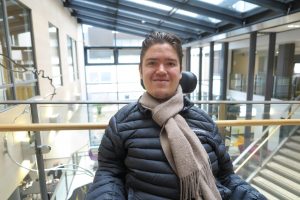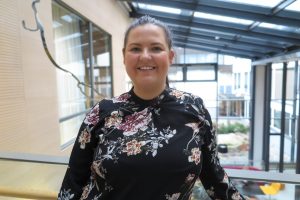Better decisions when young people with disabilities are involved
Disability issues
22 Jan 2020
Organisations for young people with disabilities must be invited to forums where decisions are being made, they must be invited at an early stage and the organisations must be involved throughout the process. Every suggestion made by the young people must be taken seriously. The perspective of young people is not of lesser value, it might just be a little different. This was part of the message to the Nordic governments when young people with disabilities convened for our expert meeting on young people and participation in Helsinki.
– In order to meaningfully involve young people with disabilities, we must see the individual. The disability is not really a factor here. Your interests must lead the way. If you are interested in politics, environmental matters or anything else, you should be allowed into the same arenas as everyone else, says Line Skåtøy, chair of the Norwegian association Unge Funksjonshemmede.

Kristian Sørensen, member of the board of the Danish association Sammenslutningen af Unge med Handicap, encourages everyone to make their voices heard.
– Not every issue has to be major. Take inaccessible spaces as an example; try speaking with those in charge directly. I like going to concerts, but the venues are often inaccessible and the websites also lack information about accessibility. I often send feedback directly to the concert venue, which usually results in them updating their website with information concerning accessibility.
Every person’s right to be heard
According to the Convention on the Rights of the Child, every child and young person has the right to express their opinion about any matter or decision that impacts them. These comments shall be taken into account at all levels of society.
– It is every child’s right, no exceptions. Unfortunately however, this is not the case for everyone living in the Nordic countries today. Children and young people often feel that they lack representation in decisions that impact their living conditions, and they also feel that they do not have access to the same arenas as their peers, says Nordic Welfare Centre project manager Merethe Løberg.
This is one of the reasons the Nordic Welfare Centre initiated the project Children, young people and participation.
– We listen to what young people have to say. We do this for example by getting youth ambassadors involved in our work. There are many benefits to involving children and young people in the decision-making process. We get more accurate information and are able to make better decisions, says Merethe Løberg.
A greater degree of understanding is needed
According to Line Skåtøy, a greater degree of understanding is needed for young people with disabilities to be able to contribute to a better decision-making process.

– We are all different. There are people with multiple disabilities or people whose disability is not outwardly visible. But we can all contribute on different levels, we are all worth it regardless. The more varied the composition of people involved in the process, the better the decisions will be.
Line Skåtøy has a heart condition and a back and neck injury, something she is happy to talk about in order to spread information about disabilities. She feels that she is being heard most of the time.
– I think it might have been easier for me than for many others thanks to my strong personality. The older I get, the easier it becomes. My parents are also active. They have always made sure that I was able to participate in the same activities as my peers, and they have always discussed matters until they found solutions regarding me going to school, where I had to be absent for long periods of time.
Kristian Sørensen also feels that he has good opportunities to influence.
– Me being active within disability politics is of course a factor, giving me the chance to attend events and meetings where I get to meet politicians and speak to them directly. The main obstacle in my everyday life with regards to being heard is people turning to my assistant rather than to me.
A resource, not a burden
Line Skåtøy and Kristian Sørensen are asked what kind of future they wish to see.
– One where people understand that the young voice has a lot to say. Both the world and technology are developing, and young people are often the first to pick up on new trends. It is so much more beneficial to society if everyone participates and helps shape it, not just A4 people, says Line Skåtøy, referring to people who can be considered part of the average.
– I hope to see more people with disabilities in the workplace. There are many who have an education, but struggle to find a job. We should be seen as a resource to society, not a burden, says Kristian Sørensen.
- The Nordic cooperation on disability does not currently have an integrated child and disability perspective. The Nordic Council of Ministers’ Committee for Children and Young People (NORDBUK) have tasked the Nordic Welfare Centre to, in dialogue with the The Council of Nordic Cooperation on Disability, develop a proposal for how the Cooperation on Disability can further develop its children and young people perspective.
- On 14-15 January, the Nordic Welfare Centre collaborated with the Finnish Institute for Health and Welfare to arrange an expert meeting concerning young people and participation in Helsinki. Kristian Sørensen is one of the experts who were appointed by NORDBUK to participate in the Nordic Welfare Centre project Children, young people and participation. Line Skåtøy served as one of the youth ambassadors during the expert meeting.

